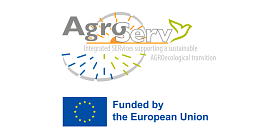AgroServ
AgroServ

Agriculture forms the basis of our society through food, feed and non-food related bio-products, and thus offers enormous social, environmental and economic benefits. At the same time, agriculture is coming under increasing pressure from global population growth, the continuing exhaustion of natural resources, environmental degradation and the impacts of climate change. Therefore, agriculture needs to move towards a more resilient approach while ensuring food and nutrition security worldwide. The role of research in general and research infrastructures in particular is crucial to support this transition by generating new knowledge, practices, technological and social innovations, policies and governance.
In this context, LUKE has joined forces with 72 partners in the AgroServ project (https://agroserv.eu/), which aims at a sustainable and resilient agriculture and agroecological transition. To support research and innovation, AgroServ provides tailored and integrated research infrastructure services in all areas related to the challenge, from molecules to organisms, ecosystems, communities, and society. Activities will follow the One-Health approach, paying particular attention to threats and risks to agro-ecosystems and promoting new agro-ecological practices and their socio-economic benefits.
The future of the food system, the conservation of biodiversity and the reduction of the climate impact of agriculture will be greatly influenced by AgroServ. By working closely with society, farmers, industry, citizens and policy makers through living labs, the consortium aims to create evidence-based policies and co-developed agricultural practices.
The project will create a pan-European and multidisciplinary data ecosystem and provide state-of-the-art agro-ecosystem services, helping society to build long-term capacity to meet the global challenges facing the agricultural sector. Furthermore, it will reinforce evidence-based decision making for a resilient and sustainable agricultural system and enable new inventions and knowledge breakthroughs in agroecology. By engaging users and through Living Lab activities, it will continue to develop the agroecology research community, encourage cross-fertilisation and enable wider knowledge sharing.
The five-year project, funded through Horizon Europe, has a budget of €15 million and is expected to start by the end of 2022. It is coordinated by the research infrastructure for Analysis and Experimentation on Ecosystems (AnaEE ERIC) (https://www.anaee.eu).
